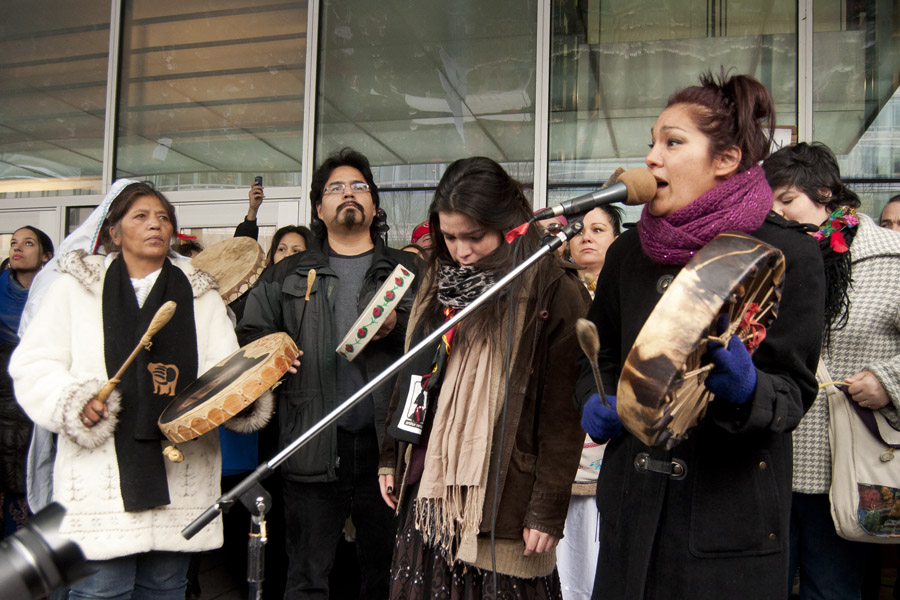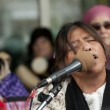Approximately 1,500 people gathered in front of the Palais des Congrès last Friday to show their solidarity with Canadian First Nations and Chief Theresa Spence, who has been on a hunger strike for the past month in protest of the federal government’s stance on Indigenous rights. Following a traditional round dance, the crowd marched through downtown Montreal.
This event was part of Idle No More, a growing grassroots movement advocating for Indigenous rights in Canada. The movement began last November, when four women in Saskatchewan used Facebook and the title “Idle No More” to draw attention to the ways in which Bill C-45—commonly known as the second omnibus budget bill—erodes Indigenous communities’ control over their land.
Bill C-45 changes legislation for more than 60 government acts. The main concerns of the Idle No More movement are the changes made to the Indian Act, the Environmental Assessment Act, and the replacement of the Navigable Waters Act with the Navigation Protection Act.
These legislation changes speed up the approval process for leasing Indigenous land, and remove protection from the majority of Canada’s rivers so that pipeline and power-line installation firms no longer need to prove that their activity will not damage a navigable waterway.
Friday’s protest attracted a diverse, multi-generational crowd. A group of elderly women were among the demonstrators, wearing brightly coloured hats and holding signs demanding that Prime Minister Stephen Harper listen to Indigenous Peoples’ concerns.
“[This movement has] been a long time coming,” a senior participant, who would only be identified as Marguerite, said. “The government and private corporations have a duty to always consult with First Nations.”
In front of Palais des Congrès on Friday, the crowd joined hands and formed a series of circles where participants turned and stamped in time to the beat of hand drums.
Two students from Dawson College handed out red felt feathers to protestors. Jeffrey Graham, an executive of Dawson’s student union, explained that he had found the ideafor the feathers online.
“We just converted a few of our red squares in our office into red feathers,” Graham said.
“[Idle No More] is kind of like a continuum to the Occupy movement and the student movement,” a student in the Concordia School of Community and Public Affairs, who would only be identified as Crystal, said. “[But it is] different because it is in response to a direct attack on First Nations people.”
Crystal also explained that she wanted to take part in the Idle No More movement because she is of Métis descent.
“My family doesn’t practice Aboriginal [customs], but I feel really connected to the land, like all Canadians I guess,” she said.
For many supporters of Idle No More, Indigenous people’s concerns are integrally linked to Canadian environmental concerns.
“We really feel strongly that our resources need to be protected, and [First Nations] peoples have always been advocates for our land,” Graham said.
The Facebook event for Friday’s protest emphasized the importance of seeing Idle No More as an inclusively Canadian movement, rather than one aimed only at Indigenous populations.
“[This is] a movement that is ready to demand an end to Harper’s relentless legislations that amount to nothing less than an outright assault on the fabric of this country,” the Facebook event page said.
Over the past two months, Idle No More protests, rallies, and teach-ins have taken place nation-wide. One of the movement’s more controversial tactics has been blockades of railway lines.
Reactions to Idle No More’s protest tactics have been mixed. U3 environmental science student Maida Hadziosmanovic’s VIA Rail train was delayed for four hours on her way back to Montreal from her home in Oakville, Ontario after Christmas.
“Though I support the cause, I did not support the protesters as they were affecting people who have nothing to do with Harper’s decisions,” Hadziosmanovic said.
“There are many other ways of getting the government’s attention,” she continued. “In my opinion, they probably ticked off a lot more people than they would have if they approached the movement differently.”
SSMU Vice-President External Robin-Reid Fraser attended Friday’s protest. She said SSMU does not have an official position on the Idle No More movement, but students will have the opportunity to learn about and discuss the issues during the “Intro to Quebec” week SSMU has planned for Jan. 21-25.
Photos by Simon Poitrimolt

















Pingback: First Idle No More teach-in at McGill fosters discussion - McGill Tribune
Pingback: Highlights from the Jan. 24 SSMU Council - McGill Tribune